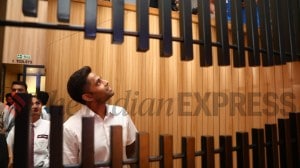Riyadh to Delhi
Behind Ansaris arrest lies a deepening bilateral engagement between India and Saudi Arabia
Behind Ansaris arrest lies a deepening bilateral engagement between India and Saudi Arabia
The arrest of Zabiuddin Sayed Zakiuddin Ansari,or Abu Jundal,at New Delhis IGI Airport is a significant step towards closure in the Mumbai attack case of 2008. Ansari is alleged to have coordinated the strike from a control room in Karachi and is wanted by the police in India in a number of cases,including the May 2006 Aurangabad arms haul and the February 2010 German Bakery blast in Pune. Ansari had moved to Saudi Arabia from Pakistan,where he had fled in 2006. Behind his arrest lies a story of cooperation between Saudi and Indian authorities.
Of course,netting Ansari required some persuasion and a DNA test from India. But the fact that he has been handed over is a mark of how much has changed in the India-Saudi Arabia relationship that was,for long,one of the least explored and exploited. That began changing with King Abdullahs visit to India in 2006 and the signing of the Delhi Declaration,followed by the Riyadh Declaration during Prime Minister Manmohan Singhs return visit in 2010. The Riyadh Declaration,along with several agreements and the extradition treaty,built on the opportunities created by the Delhi Declaration to strengthen Indo-Saudi ties on issues ranging from security and defence to energy. Indias long-term strategic understanding with Saudi Arabia started deepening,not least because of the latters geopolitical significance and the close link between the Gulf and the subcontinent on security issues. Even as Riyadh engages in pro-active diplomacy,keeping in mind a potentially nuclear Iran and its own need to maintain a stable global oil regime,India must maintain its engagement with a pragmatic international player that has grasped the emerging world order and seeks to broaden its foreign and security engagements as envisioned in King Abdullahs Look East policy.
In the present circumstances,little can be expected of Pakistan,where the civilian government has never had significant control over the terror apparatus. Saudi Arabia and Pakistan have been close since the 1970s,and Riyadh will continue to be influential in Islamabad,playing a key role in shaping the Af-Pak future,which has a direct bearing on India. That Saudi Arabia is Indias biggest oil supplier and India is a top-ranking Saudi oil importer may be the foundation of bilateral ties but Ansaris arrest hints at the relationships larger potential.






- 01
- 02
- 03
- 04
- 05

























